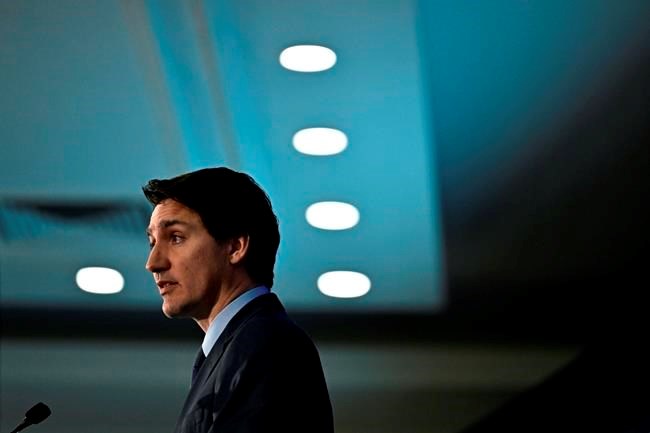OTTAWA — Prime Minister Justin Trudeau said Monday he will appoint a new independent watchdog with a "wide mandate" to investigate foreign interference in Canada and recommend how to better respond to the challenge.
The move does not include calling a public inquiry into allegations of foreign meddling in Canada's elections, against the explicit demands of opposition parties. But Trudeau left the door open to taking that step if the "special rapporteur" he appoints thinks one is warranted.
"All political leaders agree that the election outcomes in 2019, and in 2021, were not impacted by foreign interference," Trudeau said Monday evening at a news conference on Parliament Hill.
"But even if it didn’t change the results of our elections, any interference attempt, by any foreign actor, is troubling and serious."
The Liberal government is facing heavy criticism that it did not act when warned that China was trying to influence the outcome of the 2021 federal election, or that a Liberal candidate nomination had been targeted in 2019.
The Globe and Mail, citing classified records from Canada's spy agency, reported last month that China worked to help ensure a Liberal minority victory in 2021, as well as defeat Conservative politicians considered unfriendly to Beijing.
A Global News report cited anonymous sources alleging the Canadian Security Intelligence Service had urged senior Liberal party staff to rescind Han Dong's nomination in a Toronto riding in 2019 due to alleged Chinese interference in his bid to become the Liberal candidate.
Dong, who won the riding for the Liberals in 2019 and 2021, said his nomination and campaign teams have found no indication of irregularities or compliance issues regarding his candidacy or election. Trudeau said last week that it is not up to "unelected security officials" to tell political parties who can and cannot run for office and denied that it would happen.
Trudeau was heavily defensive of his government's actions on foreign interference since 2015, including setting up a protocol that has a panel of senior civil servants keep tabs on the possibility of foreign interference in elections and warn Canadians if some were found.
He said if the government was presented with "credible evidence of wrongdoing of foreign agents or officials breaking Canadian laws we would have acted."
"Lack of evidence means we have not," he said. "We are a country of laws, of rules, of evidence. And if we do not get concrete, clear evidence we will not take action."
But he also said he understands that Canadians have a lot of questions and concerns right now.
In addition to appointing an "eminent Canadian" as special rapporteur, Trudeau said he is asking both the National Security and Intelligence Committee of Parliamentarians and the National Security and Intelligence Review Agency to take on "urgent work" on foreign interference.
The former, a group of MPs from all parties and one senator who all have top-level security clearance usually referred to by its acronym NSICOP, will launch a new study on foreign interference focused on elections.
The agency, helmed by former Supreme Court justice Marie Deschamps, has a mandate to review the work of Canada's intelligence agencies. It will look at the work those agencies have done on foreign interference.
Opposition parties have been demanding a full public inquiry to probe what the government knew about attempts by foreign governments to meddle in elections, and Monday's announcement did not satisfy them.
NDP House Leader Peter Julian said after the announcement that his party still believes an "independent, non-partisan public inquiry" is warranted.
"As Jagmeet Singh has made clear, the NDP does not believe NSICOP is an acceptable substitute for a public inquiry," Julian said. "That committee is partisan, and takes place behind closed doors. The way to stop foreign actors from acting in secret is to refuse to keep their secrets.”
Conservative Leader Pierre Poilievre agreed.
"Parliament is supreme. A majority of the parties in the House of Commons have demanded a full public, independent inquiry and the continuation of the investigation by the parliamentary committee. Anything less is wholly insufficient to respond to the gravity of the situation," Poilievre said in a written statement after Trudeau's announcement Monday.
Earlier, he told reporters he would not accept a "secretive process that will never bring about the truth." While Trudeau has not yet named the special rapporteur, Poilievre predicted he would name a "Liberal establishment insider."
Trudeau said Monday there have been a lot of opinions given about the merits or flaws of a public inquiry on foreign interference, and it will be left to the independent rapporteur to recommend next steps, including the possibility of an inquiry.
"We will abide by their recommendation," Trudeau committed.
Trudeau is also looking to Australia for guidance on dealing with foreign interference, a problem that country's director-general of security said last month has replaced extremism and terrorism as their biggest concern.
In December the Liberals said they would consult experts and the public on whether to create a registry of foreign agents, similar to that in Australia.
Trudeau said he has now asked Public Safety Minister Marco Mendicino to launch consultations to guide the establishment of such a registry.
"It's very important we start with this consultation, because we have to be mindful of history any time we’re talking about registries of foreigners in our country," Trudeau said.
He is also asking Mendicino to create a "Counter Foreign Interference Co-ordinator" in his department to co-ordinate all the various actions the government is taking on foreign interference. A similar position already exists in Australia.
The RCMP also said Monday it was investigating the intelligence leaks behind the media reports on foreign interference. The RCMP said last week it wasn't investigating the alleged interference itself.
This report by The Canadian Press was first published March 6, 2023.
Mia Rabson, The Canadian Press




